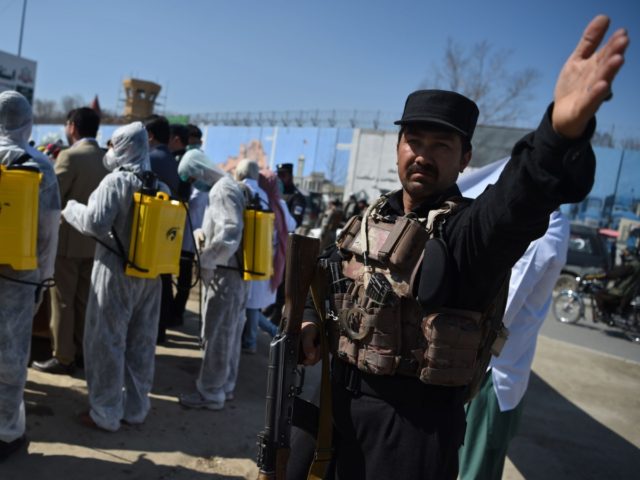Afghanistan Minister of Public Health Ferozuddin Feroz warned on Tuesday the Chinese coronavirus could kill at least 110,000 people.
Feroz said Afghanistan could “turn into another Wuhan or Qom,” the origin city of the virus in China and the first city to document cases of coronavirus in Iran, if the nation fails to take precautions now. The call to action comes amid criticism of Afghan authorities for failing to quarantine and screen 100,000 refugees returning from Iran in recent months.
Reports indicate that 100,000 Afghan refugees have returned to Afghanistan from Iran over the past few months via the land border shared by the two nations; it is not clear if this number includes refugees who entered the country before the first Chinese coronavirus case was documented in November 2019.
The Chinese coronavirus pandemic – originating in Wuhan, China, late last year – has hit Iran harder than most countries. At press time, Iran reported 24,811 infections and 1,934 deaths from the Chinese coronavirus. However, most health authorities believe these numbers – provided by the Iranian Islamic regime – to be much lower than the actual amount.
Iran has been accused of severely underreporting its numbers on the Chinese coronavirus.
Afghans have criticized the government for failing to properly screen the high number of refugees returning from Iran. According to one report by Afghan news outlet Tolo, some citizens say the government offers the flood of refugees across the border health tips, but no screening. Others point to the difficulty of tracking the refugees, as they often travel to remote areas of the country upon entering.
Responding to the criticism, Afghan Ministry of Public Health spokesman Wahidullah Mayar said, “It’s impossible to take samples from each patient, I thoroughly study statistics from other areas of the world.”
Mayar insisted that the ministry’s screening of potential Chinese coronavirus carriers met international standards, although he provided no evidence to support his claim.
Afghanistan’s failure to quarantine and test tens of thousands of refugees returning from Iran recalls a similar situation in neighboring Pakistan recently, in which Pakistani health authorities struggled to track down nearly 8,000 religious pilgrims who returned from Iran across the countries’ shared border.
This caution comes amid news Monday of a rise in new Chinese coronavirus cases throughout Afghanistan. Authorities confirmed the country’s first death from the Chinese coronavirus and reported that six new cases had appeared in three provinces in the past 24 hours. Notably, half of these new cases were recorded in Herat province, located in western Afghanistan along the country’s border with Iran. Afghanistan’s Ministry of Public Health announced a lockdown and curfew in Herat province on Tuesday. These measures will go into effect Wednesday, with help from the relevant authorities, reported Afghani news agency Khaama Press.
Speaking to reporters in Kabul – Afghanistan’s capital and largest city – Feroz said estimates also show that the disease could spread among 80 percent of Afghanistan’s population, which is over 36 million people. Emphasizing the importance of proactive efforts to prevent this possible spread, Feroz warned that Afghanistan could turn into another Wuhan (the city in China from which the coronavirus originated) or Qom (the religious pilgrimage site, recognized as the origin of the outbreak in Iran) if necessary precautions were not taken.
At press time Tuesday, Afghanistan had confirmed 74 infections and 1 death from the Chinese coronavirus.

COMMENTS
Please let us know if you're having issues with commenting.